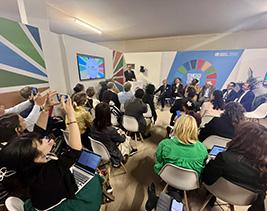
Social development in times of converging crises: A call for global action
Social development in times of converging crises: A call for global action
Global shocks and crises have become more intense, widespread and interlinked, creating consequential challenges to social development. Pandemics, violent conflicts and a spate of climate-related disasters have hit the most vulnerable people and societies the hardest.
For instance, the COVID-19 pandemic caused the first global increase in extreme poverty in 20 years and contributed to growing inequalities between and within countries. While macroeconomic recoveries are under way, the setbacks to social development are lasting longer, especially in countries in special situations.
The recently launched World Social Report 2024 estimates that the shocks and crises of the last few years could result in a cumulative economic output loss of more than $50 trillion between 2020 and 2030, reflecting lost opportunities for investing in social development. The report finds that people in countries with strong social protection systems have fared better during recent crises. However, only half of the world has access to at least one social protection benefit. To increase coverage, the report calls for a human rights-based approach to social protection, prescribed by law, that can guarantee its continuity and predictability in times of crisis.
Yet, many developing countries lack the necessary fiscal space to achieve universal social protection. International support is needed to free up and mobilize resources, including through debt treatments and additional financial and technical support. The report suggests exploring debt swaps for SDG investments that could secure long term, resilient pathways for social development.
Global action is needed to reduce systemic risks and build universal resilience against these interlinked crises. This includes developing early warning systems, accelerating climate change mitigation, ensuring global financial stability and preventing pandemics and spillovers of violent conflict.
Building on the recent Pact for the Future, the World Social Report 2024 recognizes the fourth International Conference on Financing for Development and the Second World Summit for Social Development in 2025 as opportunities to commit to further actions to advance social development.
Access the full report here.
EXPERT VOICES

EVAdvocating for better data to measure sustainable development
This month, the United Nations will hold the fifth World Data Forum attracting 3,000 participants to Medellin, Colombia to discuss the latest progress in data and statistics to advance sustainable development. The Forum will champion four themes – innovation and inclusivity, data use and value, trust and protection and partnership and coordination across four days and over 100 different events. Ahead of this biennial event, UN DESA’s Ian Rutherford tells us more.
Advocating for better data to measure sustainable development
Image
This month, the United Nations will hold the fifth World Data Forum attracting 3,000 participants to Medellin, Colombia to discuss the latest progress in data and statistics to advance sustainable development. The Forum will champion four themes – innovation and inclusivity, data use and value, trust and protection and partnership and coordination across four days and over 100 different events. Ahead of this biennial event, UN DESA’s Ian Rutherford tells us more.
What are the biggest data challenges that the Forum aims to tackle?
“Data are becoming more and more common in our lives. But oftentimes, they are not used effectively to benefit people, and the capacity to take advantage of the information they provide varies widely within different groups of society. The Forum brings together governments, academia and professional associations, civil society, the private sector and international and regional agencies to improve this situation. Within governments, the Forum is directed by National Statistical Offices and the data and statistical system they operate in as a key enabler of turning data into useful and actionable statistics for measuring sustainable development.”
How can the biennial Forum encourage continuous action on the whole range of data issues?
“The Forum’s programme gives a flavor of the wide range of activities being driven by different stakeholder groups. For example, two-thirds of the sessions in the programme are focused on the future of data and statistics covering issues related to youth, gender, climate and environment, digitalisation and modernization, capacity development, data literacy and data science including AI. The Forum is equally an opportunity to showcase the adoption and scaling up of new methods and sources including the expanded use of citizen generated data, geospatial, administrative data, household surveys, earth observation data, censuses, mobile phone and social media data with over 40 sessions in the programme. These activities are nourished by their appearance at the Forum and their work will continue beyond and perhaps into future Forums as they develop and evolve.”
What legacy do you hope the fifth Forum will leave?
“The Forum’s community has grown from 2,000 people who attended the first and second Forums in Cape Town and Dubai, to an active list of over 20,000 interested stakeholders. The Forum in Medellin is likely to be the biggest in-person gathering yet with 3,000 people in attendance. This Forum will be an opportunity to launch a renewed global action plan for sustainable development data to serve the remainder of the 2030 Agenda. The plan introduces twelve new priorities, and these priorities are complemented with new and stretching actions and matching commitments.
The Forum will also continue to be a rallying point to advocate for high-quality, timely, open, and inclusive data to accelerate progress on the SDGs and to address the multiple crises that threaten our world. It will support countries, especially those in fragile contexts, to advocate for strengthening their own data and statistical systems, improving data quality, and expanding data coverage to leave no one behind.”
For more information: UN World Data Forum
THINGS YOU NEED TO KNOW

4 things you should know about the SDG Pavilion at COP29
Showing how climate action and sustainable development support one another is critical to achieving the shared ambitions of the Paris Agreement on Climate Change and the Sustainable Development Goals (SDGs). Since 2018, the SDG Pavilion organized by UN DESA at the annual UN Climate Change Conference (COP) has grown into a premiere showcase for these connections. Here are four things to know about this year’s SDG Pavilion:
1. All eyes are on Baku, Azerbaijan, host of this year’s COP
More than 30,000 policymakers, scientists, representatives of civil society organizations and young people are expected to attend COP29 in the Azerbaijan capital, Baku, nestled on the Caspian Sea, from 11 to 22 November. COP29 is being called “the finance COP” because climate finance will be a central theme, as trillions of dollars are needed to help countries drastically reduce their greenhouse gas emissions and protect lives and livelihoods from the worsening impacts of climate change.
2. Forests will be in focus at the SDG Pavilion
Issues such as forest data, forest-based bioeconomies and legal frameworks for forests will be highlighted through the special Forest Pavilion at the SDG Pavilion. Each day will feature dedicated discussions about ways to amplify investment in forests in order to halt and reverse deforestation and accelerate collective action to achieve the Global Forest Goals.
3. The SDG Pavilion will feature 50+ other events related to energy, the ocean, transportation, gender equality and more
Some of the high-level speakers expected to participate include UN DESA Head Li Junhua, UN Forum on Forests Director Juliette Biao, the Secretary-General’s Special Envoy for the Ocean Peter Thomson, and explorer and innovator Bertrand Piccard.
4. You can watch all the SDG Pavilion action online
Check out the events live from Baku on UN DESA’s YouTube channel—or watch the recordings on your schedule—and be sure to follow UN DESA’s social media accounts for updates, too.
For more information, including the full programmes, please visit the website for the SDG Pavilion at COP29 and the UN Forum on Forests website.

MORE FROM UN DESA
Turbocharging SDG progress: 7 ways UN DESA leaves no one behind

Read more here: https://desapublications.un.org/un-desa-voice/november-2024


